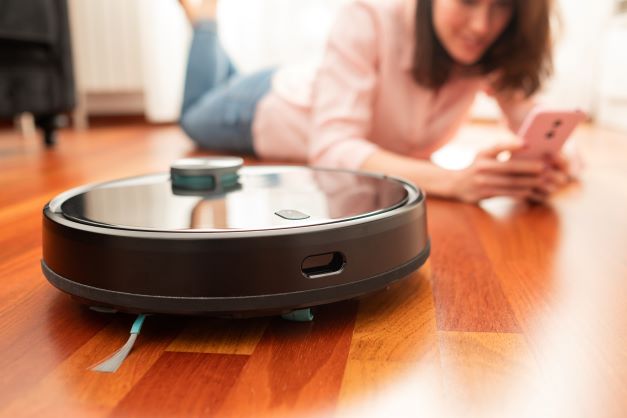40% of time spent on mundane chores could be automated within 10 years – AI experts
Tuesday 21st Feb 2023, 4.26pm

Dr Lulu Shi, postdoctoral researcher, Oxford Internet Institute and departmental lecturer, Oxford’s Department of Education, says, ‘Our research suggests, on average, around 39% of our time spent on doing domestic work can be automated, the degree of automation varies very much across different types of work.
‘Only 28% of care work, including activities such as teaching your child, accompanying your child, or taking care of an elderly family member, was predicted to be automated. Yet 44% of housework, including cooking, cleaning, and shopping, was thought to be automatable.’
Our research suggests, on average, around 39% of our time spent on doing domestic work can be automated, the degree of automation varies very much across different types of work
Dr Lulu Shi
The research team asked AI experts from the UK and Japan what difference automation was going to make to housework and other unpaid work. The experts predicted, on average, 39% of time spent on any domestic work task could be automated within the next ten years.
The predictions of the likely impact of automation for different domestic tasks varied considerably, with grocery shopping seen as most likely to benefit.
On average, experts predicted, time currently spent on grocery shopping would fall by nearly 60% in 10 years. Other repetitive domestic tasks, such as cooking and cleaning, were also seen as ripe for automation with experts predicting that time people currently spend on these tasks will be reduced by 46% in the next ten years.
Meanwhile, respondents believed time spent on physical childcare would only be reduced by 21% as a result of automation.
Male and female experts had different expectations about automation…potentially reflecting the differences in their lived experiences with technology as well as their involvement in housework
Ekaterina Hertog
Ekaterina Hertog, associate professor in AI and Society, Oxford Internet Institute and Ethics in AI Institute, Oxford Department of Philosophy, adds, ‘We find male and female experts had different expectations about automation of domestic work, potentially reflecting the differences in their lived experiences with technology as well as their involvement in housework and care work.’
The AI experts based in the UK and those in Japan offered different visions of the future, according to the study. UK-based experts thought automation could reduce domestic work time by 42%, compared with 36% reduction expected by Japanese respondents.
The authors maintain this may be because technology is associated more with labour replacement in the UK.
Nobuko Nagase, professor of Labour Economics and Social Policy at Ochanomizu University, notes, ‘In Japan, most AI experts are male. As male experts in Japan expect domestic automation to save much less time compared to their counterparts in the UK this may mean that research and development in this area is not receiving the attention it deserves and household automation may be delayed in Japan. This is alarming for me, as a woman, and I say we need to expand the number of female AI experts.’
As male experts in Japan expect domestic automation to save much less time…this may mean… household automation may be delayed in Japan. This is alarming for me, as a woman
Nobuko Nagase
The researchers also found expectations of the future varied by gender and country. UK male experts tended to be more optimistic about domestic automation compared with UK female experts. This is in line with previous studies, which show men tend to be more optimistic about technology than women. This relationship was reversed for Japanese male and female experts – and the authors speculate that the Japanese gender disparity in household tasks plays a role in these results.
Previous studies show people in the UK aged 15 to 64 spend nearly 50% of all their work and study time on unpaid domestic work, such as cooking, cleaning, and care. So, these latest findings from the Oxford and Japan researchers suggest a potential increase in leisure time as some of the domestic tasks get automated.
In the UK, working-age men spend around half as much time on domestic unpaid work as working-age women. And in Japan, the difference in time spent on domestic tasks is more apparent, with Japanese men spending just 18% of the time spent by women on domestic tasks.
Few studies have examined the automation of unpaid domestic work or predictions about automation and how they differ – depending on the AI experts consulted. This study involved 29 male and female AI experts from the UK and 36 experts from Japan. They were asked to estimate the degree to which 17 housework and care tasks might be automated over the next decade. The study’s diverse sample is not statistically representative but, the authors note, the experts’ backgrounds offer the potential for contextualising their predictions.
Download the full paper, ‘ The Future(s) of unpaid work: How susceptible do experts from different backgrounds think the domestic sphere is to automation?’
This project has been funded by ESRC in the UK and JST-RISTEX in Japan.

